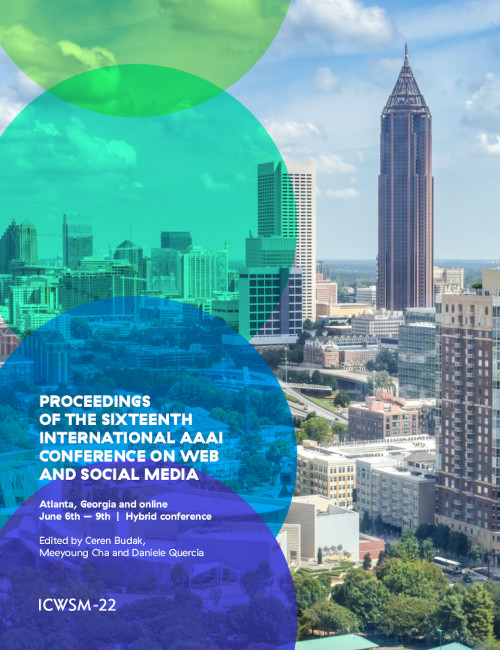Identifying and Characterizing New Expressions of Community Framing during Polarization
DOI:
https://doi.org/10.1609/icwsm.v16i1.19339Keywords:
Social network analysis; communities identification; expertise and authority discovery, Subjectivity in textual data; sentiment analysis; polarity/opinion identification and extraction, linguistic analyses of social media behavior, Qualitative and quantitative studies of social media, Organizational and group behavior mediated by social media; interpersonal communication mediated by social mediaAbstract
Chile experienced a series of important protests between October and December 2019. This social unrest, as it was called, was fueled by social inequity and radically affected the nation's status quo. A large portion of the population demanded a new Constitution and changes to the current government, whereas another part of the population rejected these social demands. This created a highly polarized scenario evidenced through online social media interactions. Analyzing controversial issues that emerge naturally from conversations in online communities can offer a more wide-scale understanding of today's political and societal discussions. Here, we analyze group polarization in social networks by studying the 2019 Chilean social unrest. Specifically, we propose an unsupervised approach for identifying and characterizing community framing (i.e., discovering and understanding polarized concepts). Our approach is based on the sequential application of community detection, topic modeling, and word embedding methods. The novelty of having an unsupervised approach is that it facilitates the performance of scalable and objective framing analyses with minimal human intervention, as it does not require prior domain or network knowledge. Using this methodology, we observe that an apparently similar conversation topic across communities can actually have completely different meanings to each group. We noted, for instance, that while an online community linked the term gente (people) with communism and terrorism, the other associated it with police and military oppression. In this direction, our work can help to contextualize real-world social issues in online platforms, describing how users discuss similar concepts with opposing views.Downloads
Published
2022-05-31
How to Cite
Sarmiento, H., Bravo-Marquez, F., Graells-Garrido, E., & Poblete, B. (2022). Identifying and Characterizing New Expressions of Community Framing during Polarization. Proceedings of the International AAAI Conference on Web and Social Media, 16(1), 841-851. https://doi.org/10.1609/icwsm.v16i1.19339
Issue
Section
Full Papers

